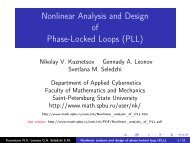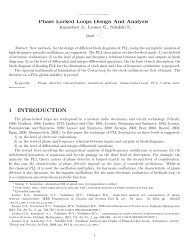Technical Sessions – Monday July 11
Technical Sessions – Monday July 11
Technical Sessions – Monday July 11
Create successful ePaper yourself
Turn your PDF publications into a flip-book with our unique Google optimized e-Paper software.
Tuesday, 17:00-18:30<br />
� TD-01<br />
Tuesday, 17:00-18:30<br />
Plenary Hall 3<br />
OR Consultancy and Case Studies 2<br />
Stream: OR Practice<br />
Invited session<br />
Chair: John Ranyard, The Management School, Lancaster University,<br />
Department of Management Science, LA1 4YX, Lancaster,<br />
Lancashire, United Kingdom, jranyard@cix.co.uk<br />
1 - Modelling Human Services Networks At Centrelink<br />
David Sier, Mathematics, Informatics and Statistics, CSIRO,<br />
Private Bag 33, Clayton South MDC, 3168, Melbourne, Victoria,<br />
Australia, David.sier@csiro.au, Mark Horn, Warren Jin, Leorey<br />
Marquez, Ross Sparks, Stuart Woodman, Jane Athanasiadis,<br />
Donald Wolters, Lance Snowdon, Lisa Parker<br />
Abstract: Centrelink delivers a range of payments and services to the Australian<br />
public. It supports people in need and assists people to become self sufficient.<br />
This talk describes a network modelling approach to the evaluation of Centrelink<br />
customer pathways, which comprise sequences of activities that customers<br />
carry out while receiving support. Our aim is to identify particular paths in<br />
the network of customer interactions with Centrelink to inform best practice,<br />
identify service delivery gaps and improvement. We describe the results from<br />
simulation models and longitudinal parametric statistical models based on customer<br />
history records and their use to predict potentially efficient pathways for<br />
customers to follow.<br />
2 - Artisanal Fisheries Analysis using the DPSIR Framework<br />
and System Dynamics: The Case of Dredge Fisheries<br />
in Portugal<br />
Ana Camanho, Faculdade de Engenharia, Universidade do Porto,<br />
DEMEGI - GEIN, Rua Dr. Roberto Frias, 4200-465, Porto,<br />
Portugal, acamanho@fe.up.pt, Joana Martins, Manuela Maria<br />
Oliveira, Miguel Gaspar<br />
This paper explores the application of the DPSIR framework to fisheries. A set<br />
of indicators that represent the key features of artisanal fisheries are applied to a<br />
case study of artisanal dredge fisheries in Portugal. This is followed by the development<br />
of a System Dynamics model to predict the behavior of the fisheries<br />
system under different assumptions concerning the evolution of the economic<br />
context. The study of dredge fisheries illustrates the potential of this approach<br />
to provide a multidisciplinary perspective of fisheries systems, including economic,<br />
social and ecologic dimensions.<br />
3 - Delivery Fee Design for Logistics Partnerships<br />
Harihara Natarajan, University of Miami, 33124, Coral Gables,<br />
FL, United States, hnataraj@exchange.sba.miami.edu, Anant<br />
Balakrishnan<br />
As manufacturers and distributors increasingly develop close partnerships, they<br />
must properly negotiate the terms of collaboration and interaction with their<br />
partners. Compensation schemes play an important role in fostering such collaborations.<br />
Motivated by a problem facing a large building-products manufacturer,<br />
we propose an optimization model to determine delivery fees, using fee<br />
tables, for a manufacturer’s distribution partners. Our industry partner developed<br />
fee tables using our model and achieved significant savings. In this talk,<br />
we will describe our model and application.<br />
� TD-02<br />
Tuesday, 17:00-18:30<br />
Meeting Room 101<br />
Issues in Game Theory<br />
Stream: Game Theory<br />
Invited session<br />
Chair: Ryusuke Hohzaki, Department of Computer Science, National<br />
Defense Academy, 1-10-20 Hashirimizu, 239-8686, Yokosuka,<br />
Kanagawa, Japan, hozaki@cc.nda.ac.jp<br />
IFORS 20<strong>11</strong> - Melbourne TD-03<br />
1 - Aggregate Monotonic Stable Single-valued Solutions<br />
for Cooperative<br />
Pedro Calleja, Economical, Financial and Actuarial<br />
Mathematics, University of Barcelona, Facultat de CC.<br />
Economiques i Empresarials, Av. Diagonal 690, 08034,<br />
Barcelona, Spain, calleja@ub.edu, Carles Rafels, Stef Tijs<br />
This paper considers single-valued solutions of transferable utility cooperative<br />
games that satisfy core selection and aggregate monotonicity. The main result<br />
is that for an arbitrary set of players, core selection and aggregate monotonicity<br />
are compatible with individual rationality, the dummy player property and<br />
symmetry for single-valued solutions defined either on the set of all games, or<br />
on the set of essential games (those with a non-empty imputation set). This<br />
result solves an open question in the literature noted by Selten and quoted in<br />
Young et al. (1982).<br />
2 - An Axiomatization of Success in Voting Situations<br />
Josune Albizuri, Applied Economics IV, UPV/EHU, Fac.<br />
Economics, Lehendakari Aguirre, 83, 48015, Bilbao, Spain,<br />
elpalirm@bs.ehu.es, Annick Laruelle<br />
We provide an axiomatization of the measures of success in voting situation,<br />
defined by Laruelle and Valenciano (2005. These measures are associated with<br />
a probability distributions over the set of all possible vote configurations. A<br />
measure of the first type gives the probability for a voter of having the result<br />
he voted for. A measure of the second type gives the probability for a voter<br />
of having the result he voted for conditioned on voting yes. And the last ones<br />
give the probability for a voter of having the result he voted for conditioned on<br />
voting no.<br />
3 - A Cooperative Model of Search Game<br />
Ryusuke Hohzaki, Department of Computer Science, National<br />
Defense Academy, 1-10-20 Hashirimizu, 239-8686, Yokosuka,<br />
Kanagawa, Japan, hozaki@cc.nda.ac.jp<br />
Most of search games have been studied in non-cooperative contexts. Here we<br />
deal with a cooperative search game, where multiple searchers behave cooperatively<br />
to detect a target. First we discuss the possibility of a coalition among the<br />
searchers and define a characteristic function. The function measures the randomness<br />
on whether the searchers can detect the target in the search operation.<br />
We complete the cooperative modeling by giving a methodology of distributing<br />
the obtained target value among the coalition members or a point in the core.<br />
� TD-03<br />
Tuesday, 17:00-18:30<br />
Meeting Room 102<br />
Metaheuristics Applications to Production<br />
Planning with Deterioration and<br />
Perishability<br />
Stream: Meta-heuristics<br />
Invited session<br />
Chair: Julia Pahl, IWI - Wirtschaftsinformatik, University of<br />
Hamburg, Von-Melle-Park 5, 20146, Hamburg, Germany,<br />
pahl@econ.uni-hamburg.de<br />
1 - Tactical Production Planning with Load-dependent<br />
Lead Times and Depreciation Effects: Model Formulation<br />
and Solution Finding using Heuristic Methods<br />
Julia Pahl, IWI - Wirtschaftsinformatik, University of Hamburg,<br />
Von-Melle-Park 5, 20146, Hamburg, Germany,<br />
pahl@econ.uni-hamburg.de<br />
Lead times impact the performance of supply chains. Their consideration is<br />
essential, because long lead times impose high costs due to rising work in process,<br />
inventory levels and large safety stocks caused by increased uncertainty.<br />
Planning models typically treat lead times as input data, but often output of a<br />
planning model implies capacity utilization which, in turn, implies lead times.<br />
The situation gets inflated if product lifetimes are restricted and deterioration<br />
effects increase utilization. We give a model formulation propose heuristic<br />
methods to solve such complex problem.<br />
59




